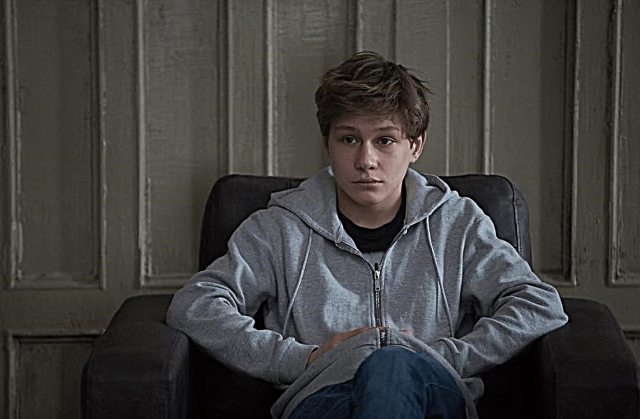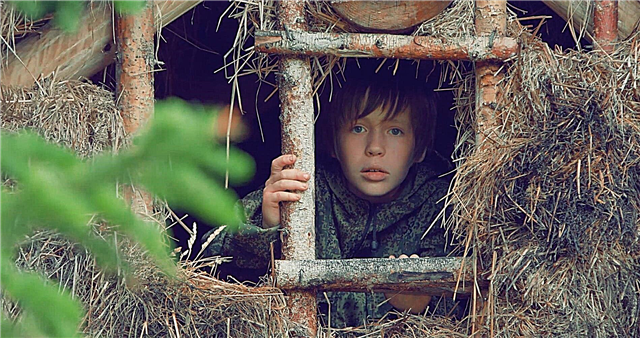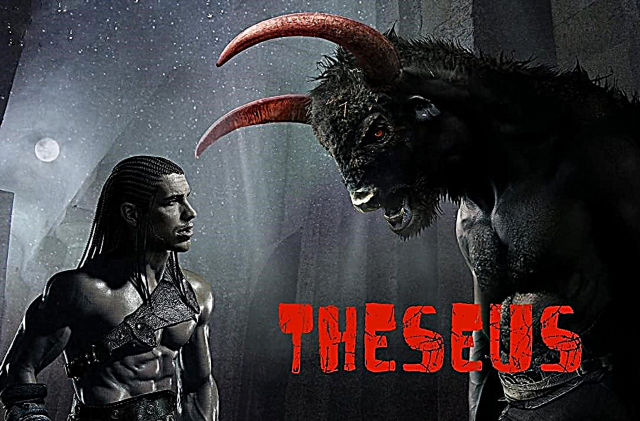The premiere of the film "The Secret Garden" took place in all online cinemas on September 1, 2020. This is a story about Mary Lennox (Dixie Egerix), a girl who was born in India to a wealthy British family and was deprived of maternal love. We will tell you how the film "The Secret Garden" was filmed, what in the plot of the new adaptation touches the most and how such wonderful and mysterious characters were created.
Rating: KinoPoisk - 5.5, IMDb - 5.5.
About the plot
Suddenly, an orphaned Mary is forced to move to her uncle's mansion shrouded in secrets in England. The rules are strictly forbidden to leave your room and wander through the corridors of a huge house, but one day Mary will find a secret door leading to an amazing world where any wishes come true - a mysterious garden ...
After the death of his father and mother, the orphan is sent to England to his uncle Archibald Craven (Oscar and BAFTA winner Colin Firth). He lives on the Misselthwaite estate in Yorkshire under the watchful eye of Mrs. Medlock (BAFTA winner Julie Walters) and the maid Martha (Isis Davis).

After meeting her sickly, trapped cousin Colin (Edan Hayhurst), Mary begins to uncover family secrets. In particular, she discovers an amazing garden that is lost in the vastness of the Misselthwaite estate.

While searching for the stray dog that led Mary to the walls of the garden, she meets Deacon (Amir Wilson), the maid's brother. He uses the healing power of the garden to heal the dog's crippled paw.
Three guys who do not fit into this world heal each other, learning more and more new possibilities of the mysterious garden - a magical place that will change their lives forever.

Producer Rosie Alison on the movie
Several performances and a Broadway musical have been staged based on the book The Garden of Mystery, four television series and four feature films have been filmed. There is a certain force in the plot that makes us return to this story again and again. Writer Alison Lurie says: “Frances Eliza Burnett told one of those stories that describe latent fantasies and aspirations. These stories embody the dreams of the entire community, ignoring commercial success to become a cultural phenomenon. "
Indeed, there is something simple and at the same time universal in the plot of the book. A lonely child in a mist-shrouded estate finds a secret garden, a kind of secret place in which he can recuperate and heal spiritual wounds with the forces of nature and friendship. This is one of the greatest atonement stories.
Why another "Mystery Garden", you ask? Well, it's been 27 years since the last full-length film adaptation. A new generation of children has appeared who are not familiar with this mysterious, fascinating and instructive story. In addition, now we have become even further from nature, and it is necessary to remind about its importance and value.
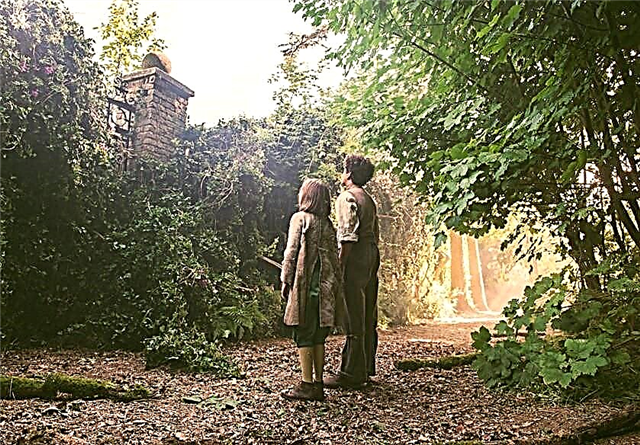
Our film adaptation is unique in its own way: the picture turned out to be more substantive, the audience will follow the unfolding plot through Mary's eyes. The boundaries between the imaginary and the real world are becoming more illusory than in previous films.
Our garden has also undergone dramatic changes and now largely depends on children: we put forward the assumption that the surrounding world of wildlife reacts to the mood of the characters, as if they can communicate with the environment with the power of imagination. The magic of the garden began to obey certain principles of magical realism.
Among other things, we shot the film differently. Instead of choosing locations by the side of the M25 and setting up a garden on a field site in a studio, we wanted to create a wilder, expanded version of the garden, limited only by Mary's imagination. We decided to shoot in some of the most famous gardens across the UK to try and capture the multifaceted beauty of nature.

During the filming, we traveled all over the UK. We worked against the backdrop of the abandoned abbeys and marshes of North Yorkshire, the amazing living arches and floodplains in Bodnant Gardens in North Wales, and the giant trees of Treba Gardens subtropical gardens in Cornwall.
We visited the mysterious prehistoric peatlands of Puzzlewood in Dean Forest and the amazing Hanging Gardens of Iford Manor in Somerset, and the list goes on. I would like to believe that we managed to capture nature in all its diversity and exactly the way children see it. We drew inspiration from real gardens, not relying on CGI-generated special effects.
One of the key changes was the postponement of the story. The plot originally took place in 1911. We decided that today's kids would like it better if we take the story outside the Edwardian era, but at the same time preserve the atmosphere of the past. Ultimately we settled on 1947, just after the end of World War II. Thus, we were able to explain the tragedy of Mary - she could have lost her parents during an outbreak of cholera during the division of British India into Pakistan and the Indian Union. The Misselthwaite Estate is still struggling to recover from the echoes of the war, as the mansion housed a military hospital. Sorrow pervaded Mary not only from the inside, but also surrounded her outside.

We decided to drop some of the secondary characters in order to focus on the key relationships for the plot. More important to us was the psychological drama of the grieving Archibald projecting his depression onto his sick son Colin. The boy suffered from delegated Munchausen syndrome, which became the basis of the plot of the original story. We sought to better understand the mysteries of the family grief that pervaded Misselthwaite. Thanks to the ghosts of the past, who do not let go of the characters in the picture, the plot began to resemble a kind of ghost story.
The phenomenally talented actors and voice-over team worked together to create a quality film in which design, costumes, production and music blend harmoniously with each other.
The painting "Mysterious Garden" is not only about children, but also about childhood. We hope that it will be interesting for adults to return to their own youth, and for the new generation of young viewers to immerse themselves in a mysterious story. Viewers will be impressed by the secrets that open up to their eyes and what hope is capable of.

About working on the film
Frances Eliza Burnett's book, The Garden of Mystery, was first published in its entirety in 1911, and from November 1910 to August 1911 was published in parts in The American Magazine. The novel, which takes place in Yorkshire, is considered a classic of English literature.
Coming up with her story, Burnett took an unusual approach, transforming the main character from a traditionally unhappy, pitying orphan into a very wayward girl. While exploring the mysterious garden, Mary learns to heal her own mental wounds. This is not a story about the all-healing power of love. This is a story about transformation, which touches upon the themes of limited capacity and the all-conquering power of nature. This is an adventure story for young readers, filled with various difficulties and unusual plot twists, like most children's stories.
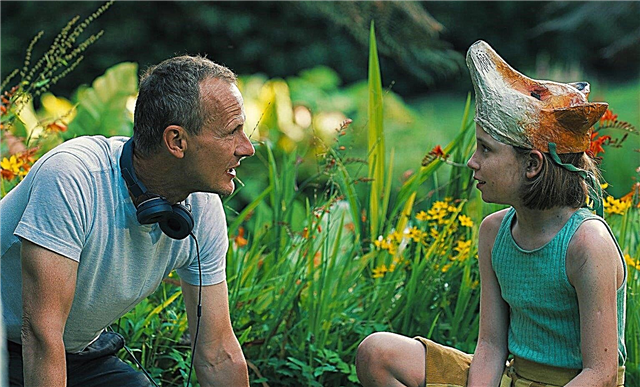
Producers Rosie Alison and David Heyman of Heyday Films have explored stories in history that will appeal to audiences of all generations. “This book has a certain power over us that makes us come back to it again and again,” admits Alison. “The very idea of a mysterious garden has something extremely simple, but at the same time universal - a lonely child in a joyless estate finds a secret garden, a secret place with magical healing powers and corrects his life with the help of nature and friendship.”
“This is a very touching story,” the producer continues. - I think everyone will be able to grasp the main message of the plot, which is that any of us can find such a secret place, and if you open the door, everything around will be flooded with sunlight, everything will change and flourish. The topic of finding a way to our own inner paradise is familiar to each of us. "
“This is one of the great tales of salvation, and in many ways the story is very mature,” adds Alison. “We believe that the picture will primarily interest women, although during the polls we were amazed at how many men admitted that they liked The Secret Garden.”

Alison gives a very clear example. Colin Firth, who played Archibald Craven, Mary's uncle, was so excited by the script sent to him from Heyday that he decided to interrupt his vacation to get the part. “Colin read the script and couldn't refuse,” says the producer. "He was deeply touched by this story."
Hayman believes that the new film adaptation will be universal in the perception of the audience, as well as the Harry Potter films that he produced. “We made a film not only for children of primary school age, but also for adults like me, for people who are sixty, seventy and over,” the producer smiles.
“Today we are even more distant from nature,” says Alison, “although we need it more than ever. All the more useful will be the story of a small door through which you can pass and unleash a potential in yourself that you never dreamed of. I hope our film will become a meaningful psychological study that clearly demonstrates what a relationship with nature should be like. "
Alison and Hayman proposed writing the script for the new film adaptation to Jack Thorne, an eminent screenwriter, whose track record includes many films not only about the vicissitudes of childhood, but also about isolation and disabilities. Among them are the films "Miracle" and "The Boy Scouting Book", the TV series "Skins" and Cast Offs, as well as the performances "Let Me In" and "Harry Potter and the Cursed Child".
“When you start working on material like The Secret Garden, it’s hard to get rid of the thought,“ That’s a good old classic that you watch on Sunday with a cup of tea, ”says Alison. - We wanted to shoot something modern that would be relevant and had a certain resonance. Jack has his own quite modern style. He knows how to describe children's emotions and manner of conversation. In addition, he is extremely interested in the topic of disadvantaged children and disabled people. Suffice it to say that he wrote the play Let Me In for the Royal Court Theater. With all this in mind, we thought he could handle it. Jack has a big heart and a vulnerable soul. He knows how to be soft, lyrical and spontaneous, so I wanted to believe that The Mystery Garden would hook him. "

Thorne liked the book as a child. Then he re-read it on the recommendation of Heyday and realized that at a conscious age he liked the novel even more. “This is an amazing book,” says the writer, “with many incredible plot twists, about an unfortunate girl who manages to find herself. Reading the book, I was amazed at how dark it turned out, and I was very impressed by it. "
The scriptwriter was especially attracted by the idea of finding out what made Mary so.
“I wanted to show that this girl's childhood was actually destroyed by adults and rebuilt by children,” Thorne explains. “What they and Colin had in common was that they suffered from a lack of adult attention, and I wanted to emphasize that aspect in the script.”
Both the book and Thorn's script describe Mary's life in India. “We spent a little time in India,” says the scriptwriter, “in the film it will be sketchy flashback scenes. But this is enough to tell the girl's story. She was not loved the way any child deserves, but there were very complex reasons for that, inaccessible to the children's understanding. Be that as it may, it was the children who brought her back to a full life. "

“Planting the ashes of her own soul with new seedlings and caring for the seedlings of new hope, Mary looked inside herself, and this is extremely important for each of us,” Thorne adds. “In addition, I would like to especially note how nature can change each of us. The film will inspire young people to leave their homes, build a hut in a garden or park, and if that happens, great! "
Thorne set to work on the script, while Alison and Heyman began looking for a director. They were lucky enough to be captivated by the project of the British screenwriter, winner of three BAFTA awards, Mark Manden, whose filmography includes the series Utopia, Crimson Petal and White, National Treasure (on which he worked with Thorne), the film Seal of Cain, and other successful projects.

“We thought of Mark very early on in the film,” says Alison. "The Mysterious Garden is unlike his other paintings, with a unique visual style and staging."
“He passes each of his projects through his heart and gets to the bottom of the psychological trauma and emotions of the characters,” continues the producer. - He filmed gloomy, dull and provocative TV projects. But at the same time he is a very attentive, gentle and sincere person. When he gets down to business, you know in advance that something sugary or boring will not work. "
Manden liked the idea immediately.

“Jack's script was classic in terms of keeping the overall mood of the book,” says the director, “but two aspects I liked especially. First, the plot tells about unloved children who find love in their friendship and who really learn to be children for the first time in their lives. Secondly, the script felt the same emotional perception of children's problems as in the book, which required a very serious, thoughtful approach. Usually adults write in an adult way, they have a completely different perception of grief than children. In the book, children also cope with their adversity in an adult way, and it seems to me very modern, in the spirit of the 21st century. "

Adaptation of literary classics
“In each story, between the lines, you can see a different story that you have never heard before. It can only be read by those with a well-developed intuition. ”- Frances Eliza Burnett.
This is not the first time David Hayman has worked on a film adaptation of the book. Suffice it to say that he produced films based on the Harry Potter series.
“I think the most important thing is to preserve the spirit of the book and not follow it word for word,” says the producer. - “Mystery Garden” is a classic of literature, so, of course, some cornerstones had to be left, but we also made a number of changes. For example, we changed the timing because we thought the movie would benefit from it visually. But we left the core of Burnett's story intact. "
“We felt that modern children would have a better view of a painting that didn't have Edwardian bonnets,” Alison explains. - We decided to postpone the action of the picture for the time immediately after the Second World War, in 1947. Accordingly, Mary's parents could have died during an outbreak of cholera during the Partition of India.
This decision helped the filmmakers create a disturbing atmosphere in the Misselthwaite mansion. According to the plot, the estate cannot recover after a hospital for wounded soldiers was founded in it.

“So it felt like the grief that was eating Mary was all over the place,” Alison continues. - Each of the characters was affected in one way or another by the war. The house has become a refuge that stands apart from the rest of the world. In such a setting, the story took on a different scale and significance ”.
The filmmakers decided to sacrifice some minor characters to better convey the relationship between the main characters, especially the complex relationship between Colin and his grieving father Archibald.
Brother Archibald and the gardener were removed from the story. At the same time, Jack Thorne introduced a new heroine - a dog, with whom Mary became friends, experiencing an acute lack of attention in the early days in Misselthwaite. It was this dog, at the behest of the screenwriter, who led the girl to the mysterious garden.

The filmmakers decided to investigate more closely the nature of the grief of the family living in Misselthwaite. This is how two ghosts appeared in the film - both metaphorically and literally. Their appearance was born of grief, the seal of which lies on all the inhabitants of the estate. Mary and Colin's mothers became very important characters in the plot. They were sisters during life and remained inseparable after death.
“The film will feature the ghosts of both mothers,” says Alison. - At the end of the film, Colin and his father Archibald will again become one family. But in our version, Mary will also get a chance to remember her parents by talking to her mother's ghost. "

The ghosts of mothers are in a peaceful mood.
“This story is about family ghosts,” adds the producer, “about the chains of family indifference that need to be broken. Mary needs to heal the wounds of her uncle's ruined family and her own mental wounds. "
Alison notes that in Burnett's book, Mary's parents seem irresponsible - they go to parties and pay no attention to their daughter at all. “Parents die, and Mary remains such a titled orphan,” says the producer. "After that, Burnett practically did not return to her mother's figure, focusing on the relationship between Colin and his father."
“We decided that the ghost of the mother could visit the daughter,” continues Alison. - During her lifetime, she deprived Mary's attention. So we decided to insert some small episodes in which we showed that grief and depression were hidden behind the external emotional detachment. "
Once in the Misselthwaite mansion, Mary hears crying at night and thinks that these are the ghosts of soldiers who died in hospital beds. She finds a secret room and begins to hear the echo of her mother and aunt's voices. Over time, she realizes that the mysterious garden belonged to Colin's late mother. “Our story reveals the idea that we live surrounded by the ghosts of our deceased relatives,” explains Alison.

Manden especially liked the idea of ghosts. “I wanted to create a kind of feeling of a scary fairy tale, so to speak,” says the director. - Our story is about a girl who goes through a terrible trauma in India, loses her parents and is on her own. Finding herself in England, in a completely alien atmosphere for her, Mary experiences an acute post-traumatic syndrome. All she has is her imagination. "
In the film, the camera switches between the half-asleep state of Mary and the cold, hazy reality. “Sometimes the viewer himself does not understand where the dream ends and reality begins,” explains Manden. - I think this is exactly what the traumatic condition should be. It seems that we were able to very accurately convey what Mary went through. This probably applies to adults as well. Colin Firth's character Archibald Craven experienced the same shock. At some point, he completely detached himself from his son, locking him in a room, thus punishing him. " Ultimately, he too will meet the ghost of his deceased wife.
The most significant changes affected the ending of the film. Critics complained about the insufficiently dramatic ending in Burnett's book, so the filmmakers decided to add fuel to the fire, creating an atmosphere of alarm and danger in the ending. It is at these moments that the ghosts fully manifest themselves.
“The climax will be on fire,” says Alison. - There is some analogy with "Jane Eyre", although this scene was not in the book. We visited many English house-museums, and almost all of them had a fire at one time. "
Fire is associated with the purification and revival of the house at the end of the film, and therefore with the revival of the family.
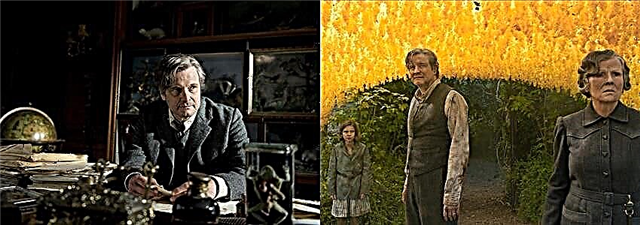
Characters
Mary Lennox is a girl with a rich imagination and high self-esteem. The filmmakers wanted to see an actress in this role, not yet known to the wide audience. The casting director reviewed the samples of about 800 applicants and, finally, the choice fell on 12-year-old Dixie Egerix.
Manden sincerely admires the exceptional talent of the young actress: “She was only 12 years old when we first met, but at 12 she was thinking like she was 26,” the director says. - It was interesting to talk to her, you could give her advice as an adult actor, but at the same time she retained the childlike spontaneity that we so needed for the scenes in the garden. I wanted the scenes in the garden to have games and fun, so that the children get dirty, chase butterflies and whistle for fun. Maybe it sounds somewhat old-fashioned, but for me it is relevant to this day. Dixie had this wonderful childishness, and I tried to demonstrate it in the film, although she plays a completely different character of the heroine. "
“I needed a girl who could understand and convey the whole range of experiences and emotional changes described by Jack in the script,” continues Manden. "At the same time, her true age should have been given by scenes in which Mary dresses or dances."

Egerix was delighted to receive the role. “I could hardly believe it,” the actress exclaims. - I really liked the fact that Mary at the beginning of the film seems to be a very offended girl who is in great pain. She lost everything. But as the plot unfolds, she turns into a charming heroine. She understands what happened to her, and I was very pleased to play such a role. And I also liked that Mary is not at all corny and says what she thinks. "
“I think this is a feminist film,” adds Egerix. - The story is told on behalf of Mary, even more than in the book. And I think it's very cool. "
Egerix notes that she especially liked the role of nature and the garden itself in the plot. The actress is convinced that this is extremely important for children of the 21st century: “I think that talking about nature is very important now, because many young people, including myself, of course, spend a lot of time on their phones. The film opened my eyes to how many beautiful and interesting things are around. We can see and feel all this if we detach from the screens of our phones! "

“My mom is a florist, my dad is a gardener, my grandfather is an agronomist,” the actress continues, “so I grew up in a family that is in close contact with nature, but it was this film that inspired me to spend more time outdoors.”
Egerix read Burnett's book, but she was really touched by Thorne's script. “Jack has masterfully redesigned the plot for the present, leaving key aspects intact,” she says. - The script clearly shows how people can change. This applies to Mary and Colin, and adults too. "
To reveal Mary's inner world, the filmmakers focused on the girl's imagination (which, by the way, was described in the book). Imagination somewhat smoothed out the odiousness of the heroine at the beginning of the story. For a more detailed study of this quality of the heroine, filmmakers turned to another book by Burnett, The Little Princess, published in 1905.
“From The Little Princess we borrowed a description of the heroine's imagination,” says Alison. "We wanted the children's imagination to be at the center of the story."
Imagination and emotionality helped Mary as the film's storyline developed. “This is partly a story about how children begin to understand the world of adults, begin to see the difficulties that they have to face,” explains the producer. “Mary herself corrects the mistakes of her childhood by reuniting her cousin Colin with her estranged father Archibald.”

Archibald Craven, Mary's uncle and owner of the Misselthwaite estate, is a rather mysterious character. In the story, he is described as the archetype of a lonely figure wandering around the castle, as in Beauty and the Beast or Jane Eyre. This role was very difficult to play, so the filmmakers offered her to one of the most talented actors of our time - Oscar winner Colin Firth.
Firth interrupted his vacation to get the role. “I think Colin is really brave to take on the role of grief-stricken Archibald,” says Manden. - He carefully researched the topic of male grief. Archibald is not one of those characters that the viewer likes. If this happens, it will only be because of how carefully Colin worked his role and how much he gave himself to the hero. "
David Hayman agrees with his colleague: “Thanks to Colin's talent, the viewer will show sympathy for his character, worry about him. We are incredibly lucky to get a star not only of British cinema, but also of world magnitude. "
According to Firth, it was very interesting to play the character described in Thorne's script. “He is very mysterious, - explains the actor, - and he does not appear in the frame right away. Mary's acquaintance with her uncle really scares the girl. In Mary's eyes, he looks like some kind of monster. Arriving in Misselthwaite, Mary finds herself in a cruel, devastated world full of despair. The estate became so thanks to Archibald. "

“Such roles are extremely interesting to me, because I have to feel all the nuances myself, to pass them through myself,” continues Firth. "Archibald is very upset about the loss of his beloved wife, but he allows his grief to develop into a terrible, destructive force."
Firth clarifies that the destructiveness of Archibald's condition affected everyone and everything around him: “He allowed grief to destroy himself and everyone who was close to him. The garden, the house, the son and all the people who worked on the estate - the pernicious effect of Archibald's grief affected everyone. ”
Firth is convinced that Archibald's all-consuming grief is outrageously selfish: “He has forgotten everyone, or at least forces himself to forget everyone. He hurts loved ones by projecting self-hatred onto them. His son was the first to fall under the influence of depression caused by Archibald's self-flagellation. "

Colin Craven is Archibald's son and the second most important child character in The Garden of Mystery. The boy is confined to his bed by the efforts of his grieving father. He really needs treatment, which becomes friendship with Mary and subsequent exits to the garden. The filmmakers invited Edan Hayhurst to play the role of Colin.
“When Edan came to audition, I thought there was something unique about the way he read,” Manden recalls. - He spoke words with an accent that could be heard in the 1940s, just like children spoke in old films. I thought this was a very worthy find for a young actor. "
“After the audition, we talked to him - in fact, there was no accent,” continues the director. - I asked where this accent came from, and he replied that he watched a lot of old films on YouTube and just copied the accent from the children's characters in these films. He was already ready for the role! "
Mrs. Medlock, housekeeper at the Misselthwaite mansion. In Burnett's book, she is described as an uncompromising, sharp-tongued woman. However, the filmmakers decided to make this character deeper and more vulnerable. The role was offered to Julie Walters, twice nominated for an Oscar. She has already worked with Thorne and Manden on the set of National Treasure, and has dated Hayman much more often, as she starred in seven films in the Harry Potter franchise and both films in The Adventures of Paddington.

Hayman was glad that he managed to interest the actress:
“It's fantastic. The viewer feels her heroine and involuntarily begins to worry about her. It may seem that in our film Julie got a dark and sometimes even frightening role, since she does not allow the main character to do what she wants. Anyway, Mrs. Medlock is authoritarian. But, considering that Julie played the role, we were able to kill two birds with one stone. She may seem cruel, but her cruelty also shows humanity. She's not just a cold-blooded, angry woman. Julie was able to make the character very versatile. "
Manden sets out to argue that Walters is one of the best actresses he has ever worked with. “She can do anything,” says the director. - When discussing the character of Mrs. Medlock, I specifically noted that I do not want her to be a cartoon villain. She is the keeper of this house, Archibald's faithful assistant, and in the book, among other things, she is described as a woman who does not forgive mistakes. However, Julie managed to bring vulnerability, mystery and humor into her image, which she skillfully hid behind a mask.
From the very first meeting, Mrs. Medlock knew that Mary would not be easy for her.
“She's not angry, though, but rather confused and aloof,” Manden notes. - It turned out very funny. Julie was able to convey a lot with her acting. I don’t think many people are capable of that. ”
According to Walters, she really liked the way Thorne created her character. “In many ways, she is a representative of the Victorian era, - says the actress. - She is extremely loyal and, probably, even a little in love with Archibald. My heroine is ready to do anything to protect Archibald and his house. "
Managing such a large mansion is not an easy task. “She's trying to get things done so that everything goes back to normal, so that the mansion is the same as it was before the tragedy,” explains Walters. - She has to somehow cope with Archibald and his depression, with his changed worldview. It's no surprise that her character is nervous. "

Walters notes the professionalism and erudition of Egerix - it was a pleasure to work with the young actress in the frame and communicate outside of it. “We played most of the scenes together,” Walters recalls. - Dixie is very talented and smart for her age. In many ways, our work was completely different from the usual shooting with children. It was interesting to talk to her. "
“Besides, the relationship between Mrs Medlock and Mary is very interesting,” adds Walters. - My heroine is completely confused by the way Mary speaks and the way she looks at the world. There is always a silent confrontation between them, as Mrs. Medlock is trying to somehow cope with the little rebel. "
Mary pacifies her natural wildness by making friends with the Deacon, who is a little older than her. The maid's brother loves to walk in the fresh air and helps Mary to get closer to nature by telling her about the garden. Deacon was played by Amir Wilson, who recently appeared on the BBC and HBO series Dark Principles. Isis Davis played his sister Martha.
“I went through a lot of boy auditions for the Deacon, but I chose Amir,” Manden recalls. - He already had experience working on the theater stage, not to mention the fact that it is simply pleasant to work with him, because he is able to keep up a conversation on almost any topic. I had worked with Isis before, so I knew in advance who to offer Martha's role to. The guys got along well. "
Now is the time to watch the movie "The Secret Garden" to plunge into the world of magic and childhood and make friends with the characters of the new fairy tale.



